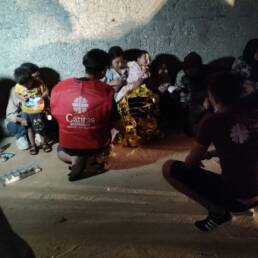As we mark the second year of war in Ukraine, Caritas Europa calls on EU Member States to plan long-term solutions for humanitarian funding and refugee protection.
The day after Russia’s full-scale invasion of Ukraine on 24 February 2022, the Caritas confederation mobilised to provide immediate support to the two local Catholic organisations – Caritas Ukraine and Caritas-Spes Ukraine – that operate in 100 aid centres across the entire country. Since then, the two charities have helped 3.8 million people, and Caritas is now the biggest national provider of humanitarian aid and social services.
However, Caritas’ support extends beyond Ukraine and focuses also on the needs of millions of refugees from Ukraine who are living in Europe. Caritas Europa has a role in supporting the humanitarian regional response in Ukraine’s neighbouring countries (Bulgaria, Czech Republic, Hungary, Moldova, Poland, Romania, Slovakia, etc.). As most of the European governments, as well as the European Commission, decrease humanitarian funding for projects inside Ukraine, we warn about the consequences in terms of the availability of assistance to people fleeing the war.
Worryingly, national Caritas organisations in neighbouring countries report increasing solidarity fatigue and challenges in implementing the European Temporary Protection Directive (TPD), which swiftly grants residency and working rights to millions of refugees. However, more and more refugees struggle to receive adequate support and face exclusion from state programmes, including those in vulnerable situations. Therefore, Caritas Europa urges European governments not to diminish their support for Ukrainian refugees and to ensure the appropriate implementation of the TPD.
In addition, with the Directive set to expire after March 2025, we call on the EU to proactively plan for the transition. Different options should be envisaged, along with a further extension of the TPD, such as switching towards other legal statuses or providing other forms of protection.
The history of Europe irreversibly changed two years ago with the full-scale invasion of Ukraine by Russia. Caritas provides support to those who survived and their families, and those who want to rebuild their lives, homes and communities. We will continue to stand in solidarity and to provide our unwavering support for as long as needed and pray for the day when the people of Ukraine can live again in peace.”
Maria Nyman, President of Caritas Europa.
Life conditions in Ukraine are still extremely difficult, with over 14 million citizens in need of humanitarian aid. In particular, Caritas-Spes Ukraine expresses its concern about the contamination of many water sources, soil and ecosystems. Moreover, nearly 3.3 million people in need of aid live in front-line communities in the east and south. In these regions of Ukraine, including the territories under the temporary control of the Russian Federation, millions struggle to have adequate access to water, food, health, housing, protection and other essential services.
“The war could last a decade. We need to be ready to provide long-term assistance to address the significant humanitarian crisis in Ukraine, which ultimately affects the global community.”
Fr. Vyacheslav Grynevych SAC, Executive Director Caritas-Spes Ukraine
Watch the video:
According to Caritas Ukraine, the war has led to an unprecedented protection crisis. Gross violations against civilians have exposed millions of people to increased trauma and mental health issues and impacted children’s well-being and education. The war has also had a devastating impact on Ukraine’s economy, forcing people to face increased levels of poverty and dependence on aid. Needs are high among the nearly 4 million people who are internally displaced across Ukraine, particularly with the 111,500 people currently living in centres.
We are doing everything possible to assist people in need, but until the hostilities stop and the occupied territories are liberated, we cannot talk about real recovery. Caritas Ukraine assists people in their current situation, where they survive, and we consider various scenarios of the development of the situation in a comprehensive approach for each individual.”
Tetiana Stawnychy, President of Caritas Ukraine
Watch the video:
The two Caritas organisations in Ukraine are also preparing a long-term plan based on humanitarian response but also reconstruction. The essential aid delivered by dedicated staff and volunteers, consisting of food and non-food items, shelter, cash aid, health and psychosocial support services as well as protection and education programmes, makes a significant difference in people’s lives and communities and deserves continued support.
More information
Jean-Yves Terlinden
International Cooperation and Humanitarian Director
Tel: +32 (0)2 235 03 95
Mob: +32 (0)492 65 65 81
jterlinden@caritas.eu
Susan Dabbous
Media Officer
Tel: +32 (0)2 235 03 94
Mob: +32 (0)478 58 54 35
sdabbous@caritas.eu




